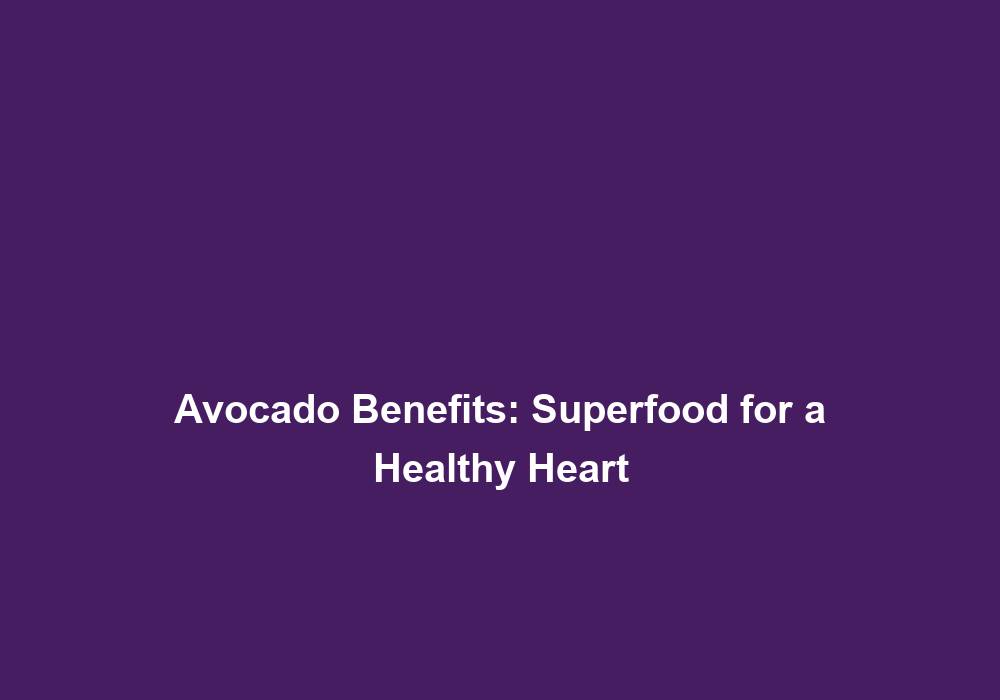Avocado Benefits: Superfood for a Healthy Heart
Avocado, also known as the butter fruit, is a versatile and nutritious fruit that has gained immense popularity in recent years. It is not only delicious but also packed with numerous health benefits, particularly for heart health. With its rich nutrient profile and unique composition, avocados have rightfully earned the title of a superfood for a healthy heart. In this article, we will delve into the various benefits avocados offer and why they should be a staple in your diet.
Nutrient Powerhouse
Avocados are known for their high nutrient density, making them a valuable addition to a heart-healthy diet. They are rich in heart-healthy monounsaturated fats, which have been shown to help lower bad cholesterol levels (LDL) while increasing good cholesterol levels (HDL). These healthy fats not only promote heart health but also provide a source of energy for the body.
Additionally, avocados are packed with essential vitamins and minerals that support optimal heart function. They are particularly high in potassium, a mineral that plays a crucial role in regulating blood pressure. Adequate potassium intake has been linked to a reduced risk of cardiovascular diseases, including hypertension and stroke.
Avocados also provide an abundance of other heart-healthy vitamins, such as vitamin K, vitamin E, vitamin C, and B-complex vitamins like folate and riboflavin. These vitamins contribute to overall heart health by reducing inflammation, supporting proper blood clotting, and protecting against oxidative stress.
Incorporating avocados into your diet ensures that you are not only getting a delicious and satisfying food but also a nutrient powerhouse that supports your heart health.
Essential Vitamins and Minerals
Avocados are particularly high in potassium, which is essential for maintaining a healthy heart. Potassium plays a crucial role in regulating blood pressure by counteracting the effects of sodium. By including avocados in your diet, you can help maintain normal blood pressure levels and reduce the risk of hypertension.
Avocados also provide an abundance of other essential vitamins and minerals. Vitamin K, for example, helps in proper blood clotting, which is crucial for heart health. Vitamin E acts as an antioxidant, protecting the heart from oxidative damage. Vitamin C helps reduce inflammation and supports the immune system. B-complex vitamins, such as folate and riboflavin, are involved in various processes that contribute to heart health.
By consuming avocados regularly, you can ensure that your body receives these essential vitamins and minerals, promoting optimal heart function.
Fiber-Rich Goodness
Another notable feature of avocados is their high fiber content. Fiber is essential for maintaining a healthy heart and digestive system. It helps lower cholesterol levels by binding to cholesterol in the digestive tract and preventing its absorption into the bloodstream. By reducing cholesterol levels, fiber helps reduce the risk of heart diseases.
Fiber also plays a role in regulating blood sugar levels. It slows down the absorption of sugar, preventing spikes and crashes in blood sugar levels. This is particularly important for individuals with diabetes or those at risk of developing the condition.
Furthermore, fiber promotes a feeling of fullness, which aids in weight management. By keeping you satisfied for longer periods, fiber can help prevent overeating and contribute to maintaining a healthy weight. Including avocados in your diet can help ensure you meet your daily fiber requirements and support heart health.
Heart-Protective Effects
Avocado consumption has been associated with several heart-protective effects, thanks to its unique blend of nutrients.
Cholesterol and Triglyceride Management
Avocados contain monounsaturated fats that can help improve cholesterol levels. These healthy fats have been shown to lower bad cholesterol (LDL) levels while increasing good cholesterol (HDL) levels. In addition to monounsaturated fats, avocados are rich in beta-sitosterol, a plant compound that helps reduce the absorption of cholesterol in the body.
By incorporating avocados into your diet, you can effectively manage your cholesterol and triglyceride levels, reducing the risk of heart diseases such as atherosclerosis and coronary artery disease.
Blood Pressure Regulation
Avocado’s potassium content plays a vital role in maintaining healthy blood pressure levels. Potassium acts as a vasodilator, meaning it helps relax blood vessels, reducing strain on the cardiovascular system. This relaxation allows for better blood flow and lowers the risk of hypertension.
In addition to potassium, avocados also contain magnesium, another mineral that supports healthy blood pressure levels. Magnesium helps relax blood vessels and improve blood flow, further contributing to heart health.
By including avocados in your diet, you can help regulate blood pressure and lower the risk of hypertension, a leading cause of heart diseases.
Anti-Inflammatory Properties
Inflammation is a significant contributor to the development of heart diseases. Avocados possess potent anti-inflammatory properties, primarily attributed to their high levels of monounsaturated fats and antioxidants.
Monounsaturated fats help reduce inflammation by decreasing the production of inflammatory molecules in the body. They also promote the production of anti-inflammatory molecules, further dampening the inflammatory response.
Antioxidants found in avocados, such as vitamin E and lutein, also play a role in reducing inflammation. These antioxidants neutralize harmful free radicals, which can cause oxidative damage and trigger inflammation in the body.
By incorporating avocados into your diet, you can help reduce inflammation, mitigate oxidative stress, and protect against the development of atherosclerosis and other heart diseases.
Antioxidant Defense
Avocados are a rich source of antioxidants, including lutein, zeaxanthin, and vitamin E. These antioxidants play a vital role in protecting the heart by neutralizing harmful free radicals, reducing oxidative damage, and preventing the oxidation of LDL cholesterol.
Oxidation of LDL cholesterol is a crucial step in the development of atherosclerosis, a condition characterized by the buildup of plaque in the arteries. By preventing LDL oxidation, avocados help maintain the health of the arteries and reduce the risk of heart diseases.
Incorporating avocados into your diet can provide you with an antioxidant boost, supporting heart health in the long run.
Incorporating Avocado into Your Diet
Now that we have explored the various benefits avocados offer for heart health, let’s discuss some practical ways to incorporate them into your diet.
Avocado Toast
One of the most popular ways to enjoy avocados is by spreading mashed avocado over a slice of whole-grain toast. This simple yet delicious breakfast option provides a great start to your day, ensuring you receive a healthy dose of heart-protective nutrients.
To make avocado toast even more nutritious, consider adding additional toppings such as sliced tomatoes, a sprinkle of chia seeds, or a drizzle of olive oil. These additions not only enhance the flavor but also add extra nutrients to your meal.
Salads and Wraps
Avocado slices can be added to salads and wraps, enhancing both the flavor and nutritional value of your meal. Their creamy texture pairs well with a variety of vegetables, making them a versatile and nutritious addition to any salad or wrap.
To create a heart-healthy salad or wrap, combine avocado slices with leafy greens, cherry tomatoes, cucumbers, and your choice of lean protein such as grilled chicken or tofu. Drizzle with a homemade vinaigrette or a squeeze of lemon juice for added flavor.
Guacamole
Who can resist a flavorful bowl of guacamole? Made with ripe avocados, lime juice, onions, and tomatoes, guacamole is a crowd-pleasing dip that can be enjoyed with vegetable sticks, tortilla chips, or as a topping for tacos. Not only is it delicious, but it also provides a healthy dose of heart-protective nutrients.
To make guacamole even more nutritious, consider adding diced red bell peppers, jalapenos, or a sprinkle of cilantro. These additions not only add flavor but also provide additional vitamins and minerals.
Smoothies
Adding avocados to your smoothies can provide a creamy texture while boosting their nutritional content. Avocado’s mild flavor allows it to blend seamlessly with fruits like bananas, berries, and mangoes. Experiment with different combinations to find your favorite avocado smoothie recipe.
To create a heart-healthy smoothie, blend together a ripe avocado, a banana, a handful of spinach, a cup of berries, and a splash of almond milk. You can also add a scoop of protein powder for an extra boost of nutrients.
Avocado Oil
Avocado oil, extracted from the fruit, is a healthy cooking oil alternative. With its high smoke point and mild taste, it can be used for sautéing, roasting, or as a base for homemade salad dressings. Incorporating avocado oil into your cooking can further enhance the heart-healthy benefits of avocados.
To use avocado oil in your cooking, simply substitute it for other cooking oils such as vegetable oil or olive oil. You can also drizzle avocado oil over salads or roasted vegetables for added flavor and nutrition.
Precautions and Considerations
While avocados offer a plethora of health benefits, it is crucial to consume them in moderation as part of a balanced diet. Avocados are calorie-dense due to their high fat content, so portion control is necessary, especially for individuals aiming to manage their weight. It is important to consider the overall calorie intake and balance it with physical activity to maintain a healthy weight.
Additionally, individuals with latex allergies may also be sensitive to avocados due to cross-reactivity. If you have a latex allergy, it is advisable to consult with a healthcare professional or a registered dietitian before incorporating avocados into your diet.
It is always beneficial to consult with a healthcare professional or a registered dietitian before making significant changes to your diet, especially if you have any underlying health conditions or concerns.
Conclusion
Avocados truly deserve their status as a superfood for a healthy heart. Packed with beneficial nutrients, including heart-healthy fats, essential vitamins, minerals, and fiber, avocados offer numerous advantages for cardiovascular health. From managing cholesterol levels to regulating blood pressure, reducing inflammation, and providing antioxidant protection, avocados are a versatile and delicious addition to any heart-healthy diet. So go ahead, embrace the avocado craze, and reap the fantastic benefits it offers for your heart and overall well-being.
Note: This article is written in markdown format.







